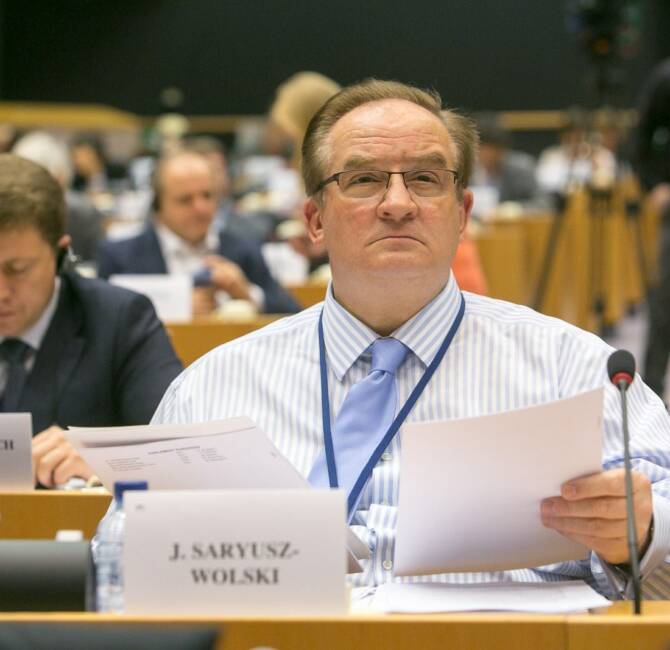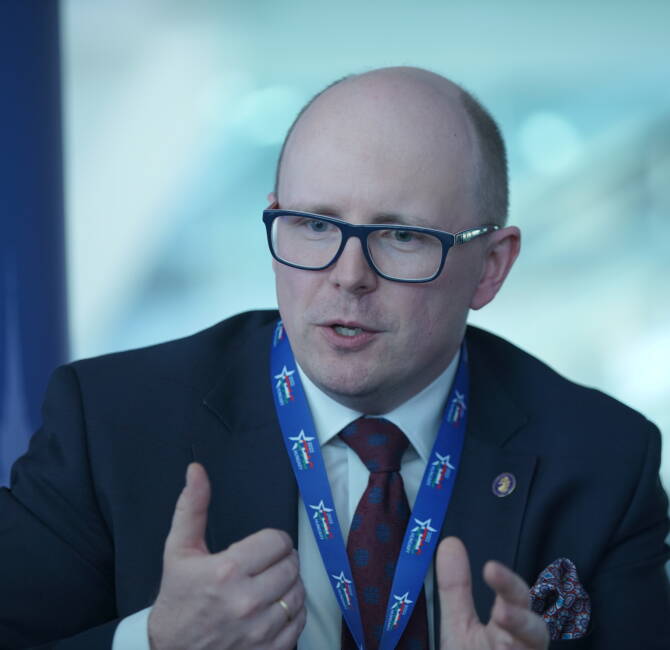France – Interview with Pierre-Yves Rougeyron, French sovereignist intellectual : “The EU, like the Soviet Union, is irreformable”
Pierre-Yves Rougeyron is a young French sovereignist intellectual. Alumni of the Economic school of war, he has written a book on the law of the 3rd January 1973, a law which mainly passed unnoticed but from thereon forces the State to borrow (with interest) from private banks rather than from the central bank (without interest). He founded the magazine and publishing house Perspectives Libres and has a large internet following in France via his videos analyzing the news.
He granted us a no holds barred interview on the consequences of the French elections, the evolution of the European Union and the perspectives of the Visegrád group.
Visegrád Post : The long drawn out French elections have come to a close with Emmanuel Macron as the elected President of the Republic and a parliament whose majority is in favor of him. You described his ascent to power as a color revolution with money and media at his heels. Don’t you think that’s a bit much?
Pierre-Yves Rougeyron: Regarding the proceedings which have been labelled ‘color revolution’, maybe the word is a bit strong, but Macron nonetheless has all the characteristics of the comprador bourgeoisie who have found their way into all the non-sovereign countries of the world to serve foreign interests. In that regard, I maintain a certain likeness to a Ukrainian oligarch reviewed and corrected by Gala [a French language weekly celebrity and women’s magazine, Ed.].
VP: In your opinion, what will be the consequences of Emmanuel Macron’s election on the European Union?
Germany knows that she has an enslaved France ready to collaborate. Macron believes that if he bleeds the French people dry, in exchange for this pound of flesh he may be able to negotiate with the Germans. It is almost written in black and write in his book entitled Révolution. He will be like Tsipras only worse, yet the economic divergences and the toxic euro will remain. You cannot stop reality via communication just as you can’t hold back the sea with your hands.
VP: During the two rounds of the French presidential elections, the affair surrounding the Whirlpool factory which will be relocated to Poland was the source of animated debate. Emmanuel Macron strongly criticized Poland saying that it played on fiscal disparities. How do you see these criticisms?
Pierre-Yves Rougeyron: There are three things to take into account. First of all, the free circulation of people and capital in such heterogenous zones could only provoke a fatal decline in job numbers in countries where social struggles had given greater leverage to the people. This first point is one of the canons of the European catechism, as carved into the treaties.
The second point is that the Eastern countries were not allowed to form their own custom zone with uniform tariffs in order to develop separately. After the fall of the Wall, autonomous industrial development was literally prohibited to them. They were not allowed to have state-organized development like in Asia, for example, because Germany wanted to ‘hinterlandify’ them according to the old war aims of imperial Germany.
Finally, Macron feigns interest in the French people. Such casualties of economic wars are unavoidable within the European project. It is a juggernaut to whom we have already sacrificed the children of Greece (42% more child mortality since the pro-EU oligarchs took power). So why wouldn’t France’s workers be next?
VP: When the countries of Central and Eastern Europe put a stop to the communist period in 1989, then joined the EU in 2004, it was, amongst other things, in the hope of catching up on the economic delay that they had compared to the West. Today, we can see that it has been a failure only worsened by emigration and the ‘brain drain’. What can we say about that period for those countries?
Pierre-Yves Rougeyron: I think they believed the worst of all Western myths: externally sponsored development. Development is endogenous by nature and the Eastern countries are now in the process learning this the hard way, but what counts is what they are going to do in order not to be bled to death, because Europe is a unique formula: NATO + finance + minority rights + immigration. An à la carte Europe is a conman’s smirking promise.
VP: The Visegrád Group has been the focus of much attention since 2015 by the populists of Western Europe regarding its firm opposition to the Merkel project of migrant quotas. Beyond that particular crisis, some see even an alternative to Brussels and the possibility of an internal revolution of the EU institutions. What do you think?
Pierre-Yves Rougeyron: Hope makes live but naivety kills. There is no alternative because the Visegrád Group (a German creation) will kindly fold up during the renegotiation of structural funds at the end of 2017. Freedom cannot be purchased on credit. The institutions of the European Union will not change. Remember that the slogan ‘another Europe’ was coined by François Mitterrand against General de Gaulle. The EU, like the Soviet Union, is irreformable and contrary to those who choose to bury their heads in the sand, eurocrats from Juncker (“no democracy against the treaties”) to Schäuble (“the European treaties are irreformable”) tell you so. So, if you want, you can redecorate your prison cell.
VP: The former president of the Czech Republic, Vaclav Klaus, has encouraged his country to leave the European Union in order to put a stop to the “you receive funding if you accept migrants” blackmail. That someone so high up in the leadership of a central European country says such a thing so clearly is quite frankly unheard of…
Pierre-Yves Rougeyron: Indeed, it is a sign of hope. But I fear that few leaders of Eastern countries are ready to pay the price of lucidity.
VP: You are a critic of the European construction, yet sometimes there are positive things which come out of it such as the recent ban on over-charging mobile users for calls made between countries within the European Union. Do you not see progress there?
Pierre-Yves Rougeyron: A great example of one of the benefits of the EU: the happy few will not have to pay heavy mobile costs. However, others will pay their bills, since 80% of the economy of a country like France, for example, rests on…. the French and their economic acts (production, consuming etc…) in France.
Therefore 80% of people are going to pay – from the revenue of their work back home – for 20% of globe trotters whose economic utility is sometimes more than questionable. But here is one possible definition of Europe: subsidizing mobility against rooted production.




